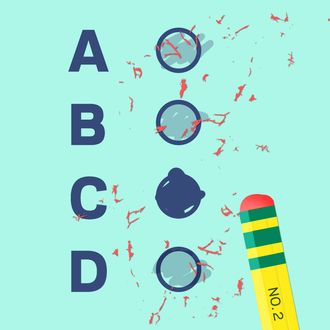
You’ve probably heard the advice on test-taking before: Always go with your first instinct! Maybe it’s something you repeated to yourself, as I often did, while you were taking exams in school. But there’s a problem with this often-repeated piece of folk wisdom: It is not actually true, according to several decades of scientific studies investigating its veracity.
In reality — and, admittedly, this should not be at all shocking — when people go back and change their answers, they’re more likely to switch them from incorrect to correct, according to more than two dozen studies on the subject rounded up by Thomas D. Gilovich, a psychologist at Cornell University who studies critical thinking and belief. (In researching the piece I wrote for Science of Us on trust and gullibility, I stumbled across a 2008 talk Gilovich that covers this subject.) Taking the time to carefully think through your first answer, in other words, likely helps guide you to the right one more often than not, when taking a multiple choice exam. Imagine that!
And yet, “stick with your first instinct” is certainly something we think is true. About three quarters of college students believe that changing an answer will result in a lower score, research has shown. Kaplan, which publishes test-prep guides for standardized tests, advises students in one of its books, “Exercise great caution if you decide to change an answer. Experience indicates that many students who change answers change to the wrong answer,” according to the authors of a 2005 paper on what they term the “first instinct fallacy.”
So how did this flawed piece of folk wisdom take hold? Really, it’s an example of loss aversion, a human tendency to feel the pain of losses more strongly than the pleasure of gains. So if you at first mark down answer A, then switch to B, but then A turns out to be correct — the regret you’ll subsequently feel over changing your answer will be stronger, and thus more memorable, than any pleasure you’d get if B does end up being the right answer.
Gilovich expanded on that idea in his talk with another example drawn from everyday life:
This is exactly the same reason why many of us, when we’re stuck in a long line at the grocery store and another line next to us is going through quite quickly, we won’t switch to it, because we think it’s more likely that that line will slow down and the line we’re in will speed up. None of us can think of any principal in the universe by which that would occur – nonetheless, experience teaches us that. And the reason experience teaches that is certain kinds of outcomes are more painful, they are burned into our memory more, and so our intuitive database is kind of distorted.
In short: It’s okay to second-guess yourself when taking a test, if it means you’re carefully and critically thinking through your first instinct. (This advice, incidentally, also seems to be a smart pub quiz strategy, according to some of my own research.) And, while you’re at it, feel free to switch to the faster-moving line at the grocery store.




